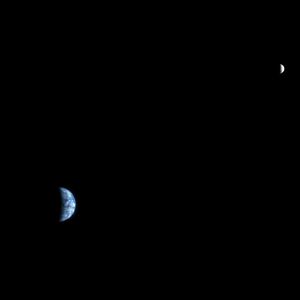Difference between revisions of "Earth"
(image added) |
|||
| (9 intermediate revisions by 3 users not shown) | |||
| Line 1: | Line 1: | ||
[[Image:earth_with_moon.jpg|thumb|right|300px|Earth as seen from Mars]] | [[Image:earth_with_moon.jpg|thumb|right|300px|Earth as seen from Mars]] | ||
| − | '''Earth''' | + | '''Earth''' orbits the sun at a distance of approximately 149 million km. Earth, the third planet from the Sun after Mercury and Venus, is the home planet of mankind. |
==Physical== | ==Physical== | ||
| − | It has a natural magnetic field (which [[Mars]] has not) that protects from [[solar wind]]. | + | It has a natural magnetic field (which [[Mars]] has not) that protects from [[solar wind]]. Earth is seen as a [[w:Astronomy_on_Mars|bright morning star]] from Mars. |
| + | Earth has a mostly nitrogen atmosphere and has liquid water. The nitrogen might be the hardest element to obtain for the eventual Terraforming of Mars. | ||
==Sociological== | ==Sociological== | ||
| − | The population on Earth is around | + | The population on Earth is around 7 900 000 000 persons<ref>https://www.worldometers.info/world-population/</ref>, increasing exponentially. However the United Nations population projections mostly show a reduction in growth in the next few decades, peaking at about [https://population.un.org/wpp/Graphs/Probabilistic/POP/TOT/ 12 billions]. |
| + | The is no sociology on Mars. Yet. | ||
{{stub}} | {{stub}} | ||
| − | [[ | + | [[Category:Astronomy]] |
| + | <references /> | ||
Latest revision as of 08:10, 7 January 2022
Earth orbits the sun at a distance of approximately 149 million km. Earth, the third planet from the Sun after Mercury and Venus, is the home planet of mankind.
Physical
It has a natural magnetic field (which Mars has not) that protects from solar wind. Earth is seen as a bright morning star from Mars. Earth has a mostly nitrogen atmosphere and has liquid water. The nitrogen might be the hardest element to obtain for the eventual Terraforming of Mars.
Sociological
The population on Earth is around 7 900 000 000 persons[1], increasing exponentially. However the United Nations population projections mostly show a reduction in growth in the next few decades, peaking at about 12 billions. The is no sociology on Mars. Yet.
| This article is a stub. You can help Marspedia by expanding it. |







